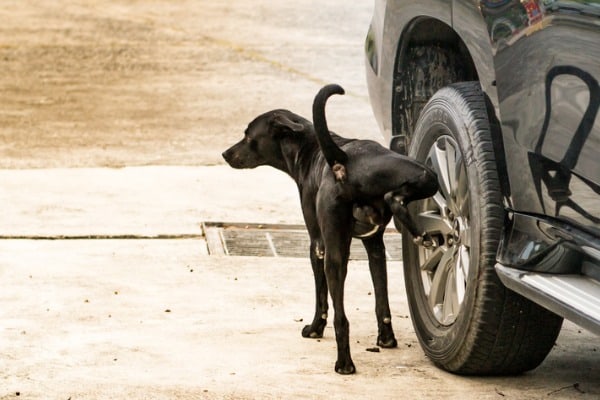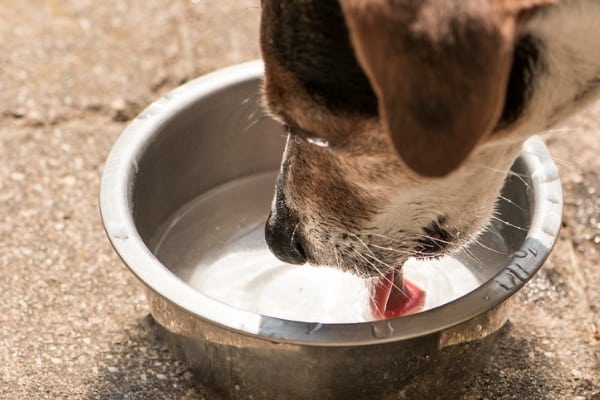Does your dog like to follow you to the bathroom? It’s awkward, but their way of letting us know they care.

And pet parents should return the favor.
Getting up close and personal with your dog’s bathroom habits might seem uncomfortable.
However, it’s one of the best ways to catch symptoms of something troubling your dog.
Many pet moms and dads let their dogs out in the backyard to do their business; others have to take their dogs on walks while they relieve themselves.
In either scenario, you might notice some things about your dog’s waste warranting a call to the vet.
See also:
- Dog Peed on My Bed in Front of Me: Here’s What You Can Do
- Dog Leaking Urine When Lying Down: 7 Causes and What You Can Do Now
- How Long Can a Dog Go without Peeing: 7 Healthy Answers
- Dog Won’t Pee Outside: 9 Ways to Help and Understand Why
- Dog Drinking Own Urine: 5 Causes and How to Stop It
For example, have you ever noticed your dog’s urine is dark in color or giving off a strong odor?
If your dog’s urine smells like fish, you don’t exactly want to be close to it.
But paying attention to these abnormal changes helps you know sooner – rather than later – that something is up with the pup.
When It’s Not Normal

Let’s be honest. If you have a dog, you probably know what their pee looks and smells like.
If it’s mostly clear, good. If, for example, their pee is foamy, that’s not good.
And neither is urine that smells…off.
Puppies and dogs can have accidents inside. And when you’re right by their side on walks, you might have caught a whiff of their urine when they stop to relieve themselves.
Normal dog urine has a distinct but not overpowering smell. This is normal.
But when does the smell indicate a problem?
A Fishy Odor
This scent can be hard to track down at first.
The oils dogs secrete through their skin can cause a faint fishy odor in their fur.
Their anal glands can also give off an overpowering, fish-like smell – especially if they need to be expressed.
Sometimes it can take a while to determine if the smell is coming from their urine.
Unfortunately for us, the best way to solve this mystery is to wait for them to pee and smell it.
Worried that dog pee is harmful to humans?
Learn the facts to be careful…but mostly to feel more at ease.
You don’t have to get too close to their urine to pinpoint if it’s the source of a fishy odor.
Often, it is so strong that you can detect the foul smell just by standing over where they peed.
You might also notice it if your yard seems to be giving off a weird smell. If so, here’s how to clean your yard of dog urine odors!
Burnt Rubber

Some dog parents report that the odd smell in their urine is more like burnt rubber or tires.
It’s a weird smell to be coming from your dog.
The culprit is usually the same thing that causes their pee to smell like fish. More on that soon.
Ammonia
Sometimes a dog’s pee can give off an overbearing, harsh scent reminiscent of ammonia.
It can be so strong that it stings your eyes or causes you to cough. You may even notice your dog smells like urine.
This is usually a sign of dehydration, but it can also indicate crystals in the urine.
Why Does My Dog’s Urine Smell Fishy?

Foul smells can indicate an infection.
In this case, a fishy odor in dog urine is a big clue that they have a urinary tract infection.
Sometimes this is the only symptom your dog has a UTI – and sometimes, this symptom is absent.
What else should you look out for?
A dog who is straining to urinate, who needs to go out more than usual, has cloudy (urine mucus) or dark urine, or urine tinged with blood could be suffering from a UTI.
In some cases, a dog might feel pain when urinating, causing them to whine or cry out.
Any of these symptoms should be reported to your vet. A UTI can be uncomfortable for your dog and smelly for you.
But left untreated?
Well, the infection can migrate to the bladder or even the kidneys, where it becomes more serious.
A vet will most likely recommend a urinalysis and possibly other lab work to diagnose the issue.
If your dog is diagnosed with a urinary tract infection, they will need a course of antibiotics to clear it up.
Just like when people take antibiotics, it’s essential to take the entire course – even if symptoms seem to disappear.
And if not…
There’s a risk of the bacteria becoming resistant to antibiotics, which raises even more issues.
The antibiotics will get your dog’s urine back to smelling normal reasonably quickly, but remember to give them all the pills your vet prescribed.
And if your female dog’s urine smells fishy?
The main suspect is still a UTI. The anatomy of a female dog makes them more likely to develop a UTI.
If your female dog isn’t spayed, smelly urine could signify they’re coming into heat.
Her body is trying to send a message to nearby males that she’s fertile – and their keen noses can pick it up from miles away.
A female’s urine can smell unusual in general if she’s coming into heat.
You might notice it’s stronger than usual or has different smells than you’ve noticed before.
Here’s what to do:
In this case, a vet is still the best person to evaluate if the dog’s cycle is to be blamed for a change in smell.
Diabetes and kidney disease can also be the cause of smelly urine and UTIs.
It might not sound like “good” news, but these issues aren’t as common as UTIs.
Of course, you don’t want your dog to have one, but they are simpler to treat than other conditions.
How to Care for a Dog with a UTI

Aside from any antibiotics prescribed by the vet, is there anything you can do to treat this condition?
Prevention is the best way to tackle urinary tract infections.
Relying solely on home remedies to cure them isn’t recommended since we can’t tell how severe the infection is.
It can also waste precious time – the last thing you want is for the infection to travel to your dog’s bladder or kidneys.
But some things you can do at home can help keep a UTI from rearing its ugly head in the future.
Take the Grooming Up a Notch
UTIs are usually brought on by the bacteria E. coli entering the urethra.
Dogs generally do a good job of keeping themselves clean in that area, but sometimes they might need a helping hand.
Dogs that have had multiple recurring UTIs could benefit from some hygiene help.
Using antibacterial wipes made for dogs can prevent any of those nasty E. coli bacteria from going where they’re not wanted.
What kind of wipes?
It’s crucial to use wipes that are labeled as safe for dogs and their sensitive areas.
But using these frequently can aid in overall health and cleanliness.
If your dog is female and has thick or long fur, there’s more potential for E. coli to get trapped around their urethra.
In this case, wipes and baths can be helpful.
If your dog is in diapers for any reason, be super mindful of the risk of urine scald in dogs.
It can also be beneficial to have a groomer clip the hair around this area, making it less likely to harbor bacteria and easier for you to clean.
Offer Plenty of Water

Keep their dish clean, full, and available at all times.
Dogs can be slobbery, messy drinkers – their dish can become a drooly, dirty mess over the course of a day.
Keep it clean!
So it’s essential to give it a good rinse when you refill it and wash it thoroughly a few times a week.
They’re more likely to drink a healthy amount each day if they have a clean bowl.
Just like the importance of good urinary care dog food, proper hydration is a key player when it comes to a healthy urinary system.
Don’t Make Them Hold It
If a dog has to hold their pee for an extended period, it can encourage bacteria to grow and cling to the insides of the urethra.
Letting them pee 3-5 times daily will help keep their urinary tract clear of bacteria.
It will also help avoid accidents since they can’t hold a full bladder any better than we can.
Potty breaks first thing in the morning, right before bed, and a few times during the day is a good schedule for adult dogs.
When accidents do happen with especially potent urine, it’s important to clean the mess up as soon as possible. Using a good dog urine remover can do the trick.
Consider Supplements

Most dogs will benefit from urinary health supplements, but especially those who have had infections in the past.
As always, consult with your vet before starting any new vitamins.
But in general, supplements containing cranberry, antioxidants, or D Mannose can give your dog a chance to stay ahead of pesky infections.
What about probiotics?
Probiotics can also make a great addition to your dog’s supplement regimen.
They encourage the growth of good bacteria, which will fight off any harmful bacteria that might sneak into your dog’s bladder.
If your dog is on antibiotics for a UTI, your vet might also prescribe a strong probiotic to help repopulate those good bacterial colonies.
No More Fishy Smells
Rotten fish, including your dog, isn’t a smell anyone wants hanging around.
Even worse is the thought that your dog could be feeling ill or uncomfortable.
There can be several causes for dog urine that smells like fish, but the most likely one is a UTI.
Remember that only a vet can accurately diagnose this condition.
Once they do, it’s just a matter of getting your dog to take their meds and possibly some supplements to get them feeling better.
Fishy-smelling urine will be the least of your worries – trying to hide their pills inside treats is another story.
